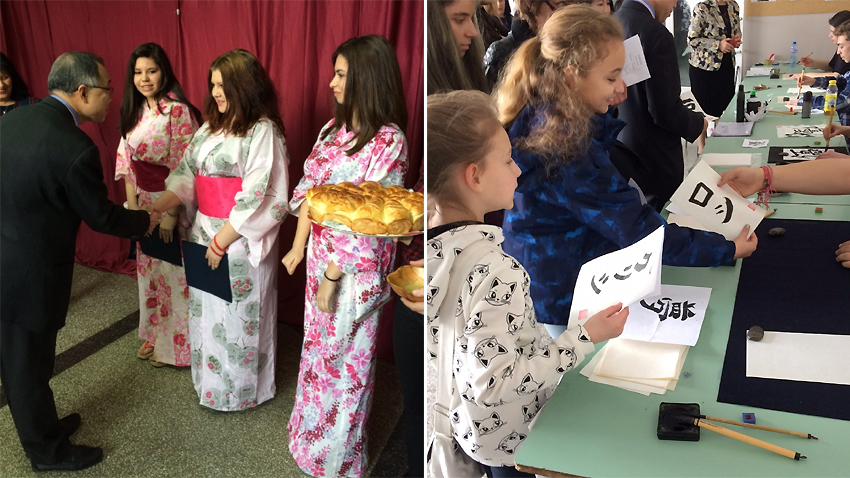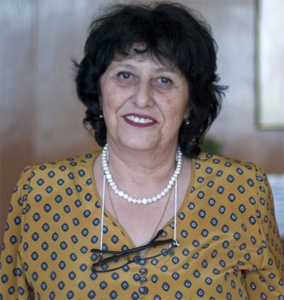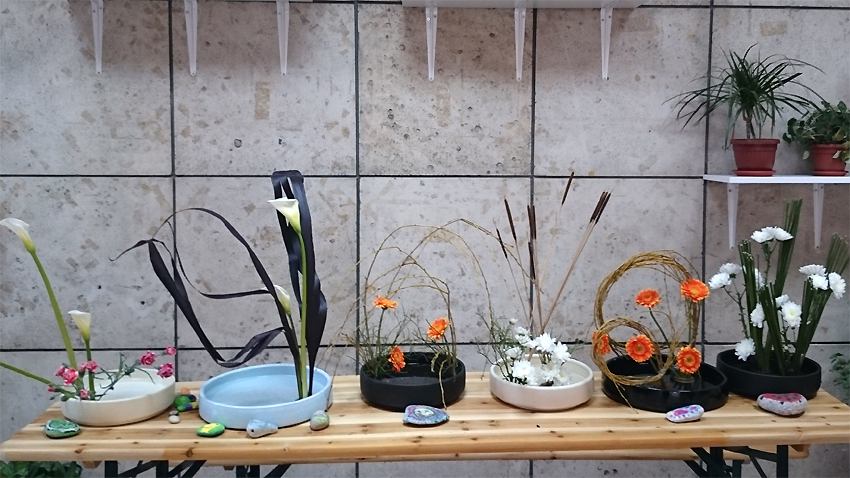As it is springtime, Tokyo has officially unveiled the blossoming season of the sakura – the Japanese tender pink cherry blossom tree, which is considered to be the symbol of the country. The event was a festive occasion for the 138th high school in Sofia, where the language and the ancient culture of Japan has been taught as of 5 years now. The Bulgarian students study the literature of the East and they know that the blossoming of the Japanese cherry has been honored since the 8th c. BC with all the beauty and tender sadness of life’s transience itself.

A cultural exchange program between the East and the West was started at the 138th high school since 2009. Today some 1,400 students study there in different groups 7 languages from various parts of the world. The students first get acquainted with the culture and traditions of the respective country and the typical lifestyle elements of the Japanese people have found many fans among them. In the words of the teachers, the young Bulgarians who study the Japanese language are different from their coevals even with their appearance and behavior. Many of them get so attracted to the art of the anime that they often try to resemble the characters in their clothes and hairdos. The skills of haiku and ikebana are also taught at the school. The young enthusiastic teachers have the greatest contribution to this huge interest shown towards the Japanese language. They organize on their own the traditional spring fest at school and it has been attended by Japanese Ambassador to Bulgaria H.E. Mr. Shinichi Yamanaka. ‘Some 130 students are now attending the Japanese language classes,’ says Magdalena Krasteva, the principal of the 138th Prof. Vasil Zlatarski School in Sofia.
 “I am really glad that all the teachers are young – this gives hope that the teaching profession sees new faces. They are ambitious and the kids have this very strong relation with them. They created together this magnificent festival of Japanese culture. Anything Japanese attracts them all and now the students are preparing themselves for participation in a rhetoric competition. It is a tough contest, it requires the rhetoric skill and the ability to keep the public’s attention. It is not a coincidence that the Japanese embassy, different foundations and friends of Japan are regular guests to the school. Many of our children pay visits to the embassy. They see there the manners, gain self-confidence and even more enthusiasm to study the language at school.”
“I am really glad that all the teachers are young – this gives hope that the teaching profession sees new faces. They are ambitious and the kids have this very strong relation with them. They created together this magnificent festival of Japanese culture. Anything Japanese attracts them all and now the students are preparing themselves for participation in a rhetoric competition. It is a tough contest, it requires the rhetoric skill and the ability to keep the public’s attention. It is not a coincidence that the Japanese embassy, different foundations and friends of Japan are regular guests to the school. Many of our children pay visits to the embassy. They see there the manners, gain self-confidence and even more enthusiasm to study the language at school.”
According to Magdalena Krasteva, the kids who study Japanese are more focused on their work and more restrained in their manners. She recalls the popular Japanese saying that the only persons who are not obliged to bow to the emperor are the teachers. ‘We have plenty more to take from their lifestyle and view of the world,’ Magdalena Krasteva says and adds:

“Japanese is my teenage love. I would read anything in Japanese as early as during my school years. I was often attracted by the fact that their lifestyle was very different from ours. They radiate this typical aristocratism which I haven’t seen with other nations. Besides that they control their emotions to a degree of perfection. The teaching profession is really honored in Japan. Furthermore, the art of ikebana shows us via the beauty of flowers how life can be devoted to the search of harmony. One cannot but feel attracted by the appearance of the Japanese lady or the interior of her home. They have this special attitude towards details there and their entire sense of harmony and beauty is input into everything, even into the smallest detail. We admire the discipline and cleanness the Japanese students maintain in their classrooms and we try to do the same things in our school as well.”
English version: Zhivko Stanchev
A little over 1,450 Leva is the sum needed per month by an individual living in a one-person household, and a total of 2,616 Leva for the monthly upkeep of a three-member household - as is the most widespread model in Bulgaria at the moment (two..
The traditional "Easter Workshop" will be held from April 23 to 26 in the Ethnographic Exposition of the Regional History Museum - Pazardzhik. Specialists from the ethnographic department of the museum will demonstrate traditional techniques and..
In response to a listener's question, in a series of publications Radio Bulgaria presents to its multilingual audience the types of documents giving the right to reside and work in Bulgaria to foreign citizens of third countries . In the..
In response to a listener's question, in a series of publications Radio Bulgaria presents to its multilingual audience the types of documents giving the..
The traditional "Easter Workshop" will be held from April 23 to 26 in the Ethnographic Exposition of the Regional History Museum - Pazardzhik...
A little over 1,450 Leva is the sum needed per month by an individual living in a one-person household, and a total of 2,616 Leva for the monthly..

+359 2 9336 661
